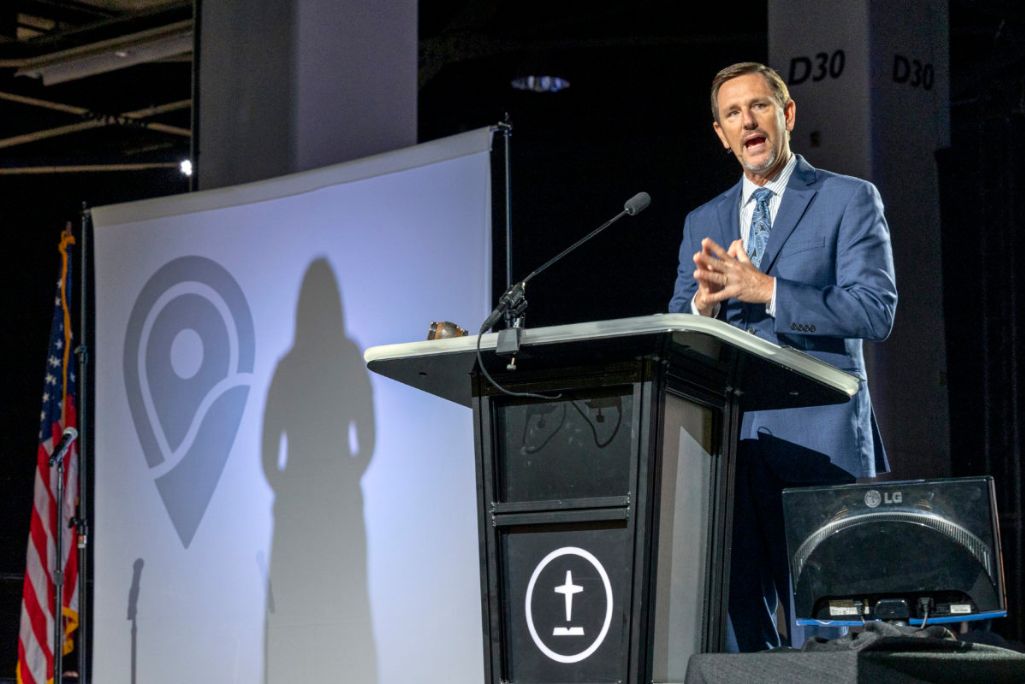
(EDITOR’S NOTE — Adam Groza is the president-elect of Gateway Seminary of the Southern Baptist Convention (SBC) in Ontario, California.)
I love being a Southern Baptist. Southern Baptists have given me a denominational home, a world-class seminary education and a meaningful ministry for the past 14 years at an amazing seminary filled with godly and gifted servant leaders.
I wasn’t born into a Southern Baptist family or raised in a Southern Baptist church. I’m not even from the South (unless you mean Southern California). I grew up with no relational connection to any Southern Baptist ministry leaders. My parents were faithful believers but had no academic background — my dad sold insurance, my mom worked in a school cafeteria, and most of my life, they threw a paper route in the middle of the night to make ends meet, often bringing us kids along to help throw papers.
After becoming a Christian in high school, I grew as a disciple and sensed a call to ministry in college, and then attended a non-SBC seminary. During seminary, I learned about a thing called the Southern Baptist Convention. My dear friend Stacy Johnson, a Southern Baptist pastor, suggested that I look into doctoral studies at an SBC seminary. I followed his advice, and while pursuing my doctorate at an SBC seminary, I read the clear biblical commitments of the Baptist Faith and Message, I learned about the greatest mission force in the history of the world, and I started attending (and later joined and pastored) a Southern Baptist church.
I owe a debt of gratitude to the SBC.
Southern Baptists have given me a relational network of brothers and sisters who are united in a singular desire to see the Word of God proclaimed around the world. Southern Baptist organizations and institutions in the West like Gateway Seminary, California Baptist University (CBU), the California Baptist State Convention (CSBC), the Baptist Foundation and local associations work together with other national partners like the North American Mission Board (NAMB) and the International Mission Board (IMB) to honor the Lord Jesus Christ in fulfillment of the Great Commission.
In my experience, if you want the real SBC, you won’t find it online. You’ll find the real SBC at local association pastors’ breakfasts, where brothers come together to pray for one another and bear one another’s burdens. You’ll find the real SBC at local church outreach events, Vacation Bible Schools, church small groups and Sunday worship services where Christ is exalted, the Word is preached and people from all ages and ethnicities covenant together in membership to hold one another accountable to following Jesus.
You’ll find the real SBC if you go with a Southern Baptist church on a short-term mission trip, follow a ministry leader to visit a sick church member in the hospital, celebrate the birth of a child or mourn over the loss of a departed saint.
The first lesson I’ve learned in the process of becoming president of an SBC seminary is that Southern Baptists are generous, biblical, thoughtful brothers and sisters who want to cheer, support and celebrate the advance of the gospel.
I would encourage anyone questioning their involvement in the SBC to base their judgment and assessment on real-life experience with Southern Baptist churches and ministries. We are far from perfect, but the reasons for staying in denominational fellowship and cooperation are greater than the reasons for going it alone.
In California, non-denominational conservative evangelical churches regularly ask how they can join the SBC! I’ve personally met with church leadership teams in Northern California and walked them through the reasons they should become a Southern Baptist church. There is truth to the old saying: You are your own worst critic. Self-reflection and self-correction are right and helpful, but obsessive self-criticism is harmful and prideful at the core. As C.S. Lewis said in “Mere Christianity,” “Humility is not thinking less of yourself, but thinking of yourself less.”
The second lesson I’ve learned in the process of becoming the president of an SBC seminary is that godly influence, character and gospel impact matter more than titles, accolades and human applause.
On my journey, it’s been my joy to serve as a lay elder, a deacon, a volunteer youth leader and a youth pastor in Southern Baptist churches. I even had the privilege of being on the worship team for a Southern Baptist church plant in the Bay Area! I have fond memories of volunteering for an Awana youth group on Wednesday nights in San Rafael, California, where oftentimes only three or four students would show up. That group was led by a young man named Noe, who at the time was a Gateway student.
Today, Dr. Noe Garcia is the senior pastor of North Phoenix Baptist Church in Arizona and preaches to thousands of people every week. It’s true what the Bible says: Humble yourself before the Lord, and He will exalt you (James 4:16).
The third lesson I’ve learned in the process of becoming the president of an SBC seminary is to focus on what’s eternal.
All of us will pass away and be forgotten. The books we write, the sermons we preach, the buildings we build and the institutions we lead will all pass away. However, the Word of God endures forever (1 Peter 2:25). The people we reach with the gospel — that body of Christ, which includes all of the redeemed of all ages, believers from every tribe, and tongue, and people and nation — will last for eternity. Human history is hurtling toward a glorious conclusion with the return of Jesus, a new heaven and a new earth. The time is short, the mission is clear and the job is not done.
At the end of Paul’s life, he asked his young protégé Timothy for a cloak, books and parchment paper for writing. Scholars debate the exact meaning of this request, but one thing is clear: Paul was learning to the end.
Seminaries equip students with the tools for a lifetime of learning. As a new seminary president, I personally have much to learn and many ways to grow. I look forward to serving the churches of our denomination with you, learning together, partnering to advance the gospel, and then being forgotten (Ecclesiastes 2:16).


